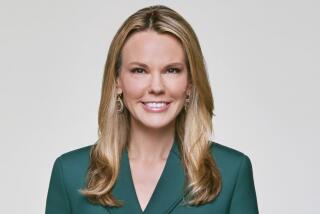IF WRIGHT’S RIGHT, NBC NEEDS ONLY FINE-TUNING
- Share via
NEW YORK — TV critics who grumble about programs may disagree with Robert C. Wright’s view of what ails network TV today. Wright says its problems are that “advertising revenues have flattened off, viewership has declined, and programming has increased in cost.”
But then, his view is corporate, not artistic. He’s NBC’s new president. Coming from the executive ranks of General Electric, he began work after the voluntary exit of board chairman Grant Tinker, the acclaimed architect of NBC’s rebound in profits and ratings.
On the job since Sept. 1, Wright has been busy learning the ropes and meeting the troops. This month he also began lunching with small groups of reporters, invited to pose questions to the relatively unknown man now running the House That Tinker Rebuilt.
Wednesday marked his third such eat-in at NBC’s executive dining room. He fielded questions ranging from prime-time news programs to speculation about cost-cutting moves and possible layoffs at NBC that have caused unease there ever since GE acquired it and parent RCA Corp. for $6.3 billion this year.
(Such belt-tightening already has occurred this year at Capital Cities/ABC, which cut 600 jobs, and at CBS Inc., which eliminated 700 positions.)
During lunch, Wright, crisp but pleasant in manner, also said he was “surprised” by the admission of top Capital Cities/ABC executives on Tuesday that the ABC television network--beset by low ratings and flat advertising revenue--would lose money this year and probably have another “modest loss” in 1987.
But, he added after a second’s reflection, “I guess it didn’t surprise me.”
When Capital Cities bought ABC Inc. this year for $3.5 billion, he said, “I think they wanted the network,” despite its problems. Now, he said, “My guess is that they really are surprised” at the extent of those problems “and they are disappointed.”
Wright, who oversees all of NBC’s operations, not just the television network, said his network--first last season in prime-time ratings and in the lead so far this season--will definitely be profitable again this year.
But NBC, like its rivals, also faces lean economic times, rising program costs and strong competition for the advertising dollar from cable and independent stations, he said.
For that reason, he said, division-by-division reviews of NBC’s operations--begun before Tinker left to return to independent production in Hollywood--are still under way. The aim is to find ways to make the 8,000-employee company more efficient.
The reviews will be finished by “next month or so,” Wright said. But he was not specific about possible job cuts, other than to say that over the next year there more likely will be “a net reduction (of personnel) as opposed to a net addition.”
He summed up his philosophy of management by saying that “I’m a believer in fewer people with more responsibility.”
Pressed later on when a decision on any job cuts at NBC may come, he replied: “You’re driving me down a path where there’s a guillotine and tons of bodies. It isn’t going to happen like that. No matter what happens, whatever actions we take are not going to be dramatic.”
When a decision on job cuts is made, will NBC announce it, as did CBS Inc., and as did some divisions of Capital Cities/ABC?
“No,” Wright said, adding: “I don’t have a day and date and a number in mind. But to the extent it becomes a real issue--and as you’re suggesting it might--we’ll have to discuss that.”
On the news front, he was asked if he’d always want a weekly news program on NBC’s prime-time schedule, be it NBC News’ new “1986” news-magazine series, or a different news effort, should “1986” falter.
“We’d like to get as much news material on the schedule, including prime time, as is reasonable,” he replied. Asked to elaborate, he said it’s a matter of economics--determining whether the lower cost of producing a weekly news program (as opposed to an entertainment program) is worth the lower advertising revenue it’s likely to generate.
With a news program, he said, air time is taken from the entertainment division for a product “that is a lot less valuable from a revenue standpoint. . . You can’t ignore that issue.” Nor, he said, can a network ignore that some affiliates just won’t carry the program and instead will opt for more lucrative entertainment fare provided by an outside source.
A weekly prime-time news broadcast “is a great idea,” he said, provided it can be done in a way that gets both a solid audience and affiliate support. He cited CBS News’ durable, consistently high-rated “60 Minutes” as a prime example.
“That is a very fine show,” he said. “But it has all the characteristics of a first-class entertainment show. And you can’t ignore that.”
In a remark no doubt meant in admiration but one that likely will raise the hackles of Mike Wallace and the four other “60 Minutes” correspondents, Wright added that, “You have some of the finest actors on television on that show.”
Were one to think of “60 Minutes” from the standpoint of NBC Entertainment President Brandon Tartikoff, Wright added, Tartikoff would “tell you that that (series) is one of the best-scripted, best-produced and best-acted shows in television.”
It all boils down to how a news program, whether a documentary or a news-magazine series, is put together, Wright said.
“The fact of the matter is,” he said, “production values, the appearance of recognized talent, giving viewers some kind of handle on what it is they’re looking at, all those sorts of things which make an entertainment show successful can’t be ignored in putting together a news show.”
More to Read
The biggest entertainment stories
Get our big stories about Hollywood, film, television, music, arts, culture and more right in your inbox as soon as they publish.
You may occasionally receive promotional content from the Los Angeles Times.










